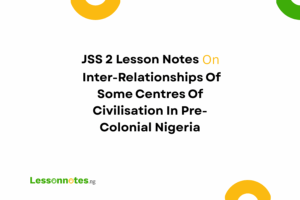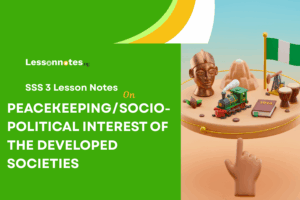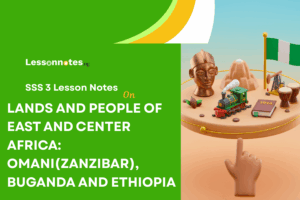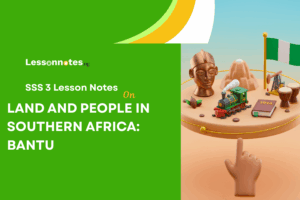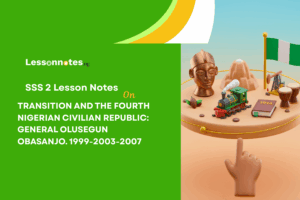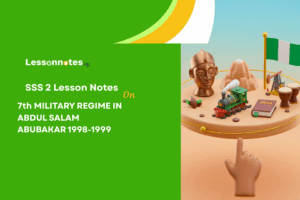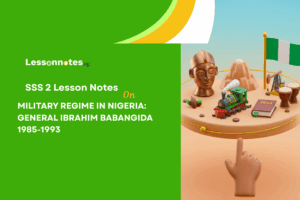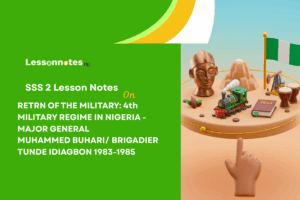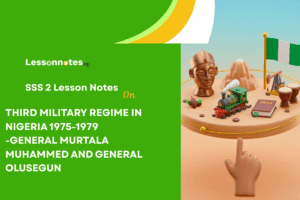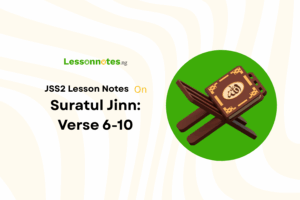Nigeria Civil War 1967-1970 SS2 Nigerian History Lesson Note
Download Lesson NoteTopic: Nigeria Civil War 1967-1970

The Nigerian Civil War was a big fight that happened in Nigeria from 1967 to 1970. It is also called the Biafran War. This war started after Nigeria got freedom from Britain in 1960. The new country had many different groups of people who spoke different languages and had different ways of life.
The main groups in Nigeria were the Hausa-Fulani in the north, the Yoruba in the southwest, and the Igbo in the southeast. These groups did not always get along well. There were big differences in how rich or poor people were in different parts of the country. The north had more people, but the south had more schools and jobs.
Events Leading to the War
In January 1966, some army officers, mostly Igbo, tried to take over the government. They killed many leaders, including the Prime Minister, who was from the north. Many northern people were angry because they thought the Igbo were trying to take control of Nigeria.
In July 1966, northern army officers did another takeover. They put Lieutenant Colonel Yakubu Gowon in charge. After this, many Igbo people living in the north were attacked and killed. About 30,000 Igbo people died, and about 1 million Igbo people ran away back to the eastern part of Nigeria where most Igbo lived.
The leader of the eastern part, Colonel Odumegwu Ojukwu, asked for safety for his people. When the talks failed, on May 30, 1967, he said the eastern part was now its own country called the Republic of Biafra.
The War
The Nigerian government did not want Biafra to leave. They thought if one part left, other parts might also want to leave. Nigeria also did not want to lose the eastern part because it had a lot of oil.
The war started in July 1967 when Nigerian forces attacked Biafra. At first, Biafran soldiers did well and even took some land in the mid-west. But soon, Nigerian forces pushed them back.
Nigeria used many ways to fight Biafra:
- They blocked food and medicine from getting into Biafra
- They took back important cities like Enugu and Port Harcourt
- They got help from countries like Britain and Russia
Biafra did not have as many soldiers or weapons as Nigeria. They made their own weapons and got some help from countries like France and Portugal. But they could not match Nigeria’s strength.
The Suffering
The war caused a lot of suffering. Because Nigeria blocked food from getting into Biafra, many people, especially children, did not have enough to eat. Pictures of hungry Biafran children were shown around the world, and many people felt sad about what was happening.
It is thought that between 1 and 3 million people died during the war. Most of them died from hunger and sickness, not from fighting.
The End of the War
By 1969, Biafra was losing the war. They had lost most of their land and were running out of food and weapons. On January 15, 1970, Biafra gave up and the war ended. Ojukwu left the country, and Biafra became part of Nigeria again.
After the War
The Nigerian government said “No Victor, No Vanquished” to show that they did not want to punish the Igbo people. They started a program called the 3Rs:
- Reconstruction: Rebuilding damaged buildings and roads
- Rehabilitation: Helping people who were hurt by the war
- Reconciliation: Bringing the different groups back together
The government also tried to share money from oil to all parts of the country. They moved the capital from Lagos to Abuja, which is in the middle of the country, to show that all regions are important.
Lessons and Impact
The Nigerian Civil War had many lasting effects:
- It showed the problems that can happen when different groups in a country do not trust each other
- It made Nigeria’s leaders work harder to keep the country together
- It led to changes in how Nigeria is divided, with more states being created so that all groups feel represented
- It showed the world the problem of hunger during wars, which led to more international help in later conflicts
Even today, some Igbo people still feel they are not treated fairly in Nigeria. There are groups that still call for Biafra to be independent. But many Nigerians, including Igbo people, want to keep the country together and make it better for everyone.
The Nigerian Civil War reminds us that it is important for all groups in a country to feel they are treated fairly and have a voice in how things are run. It also shows us the terrible cost of war, especially for ordinary people who just want to live in peace.


